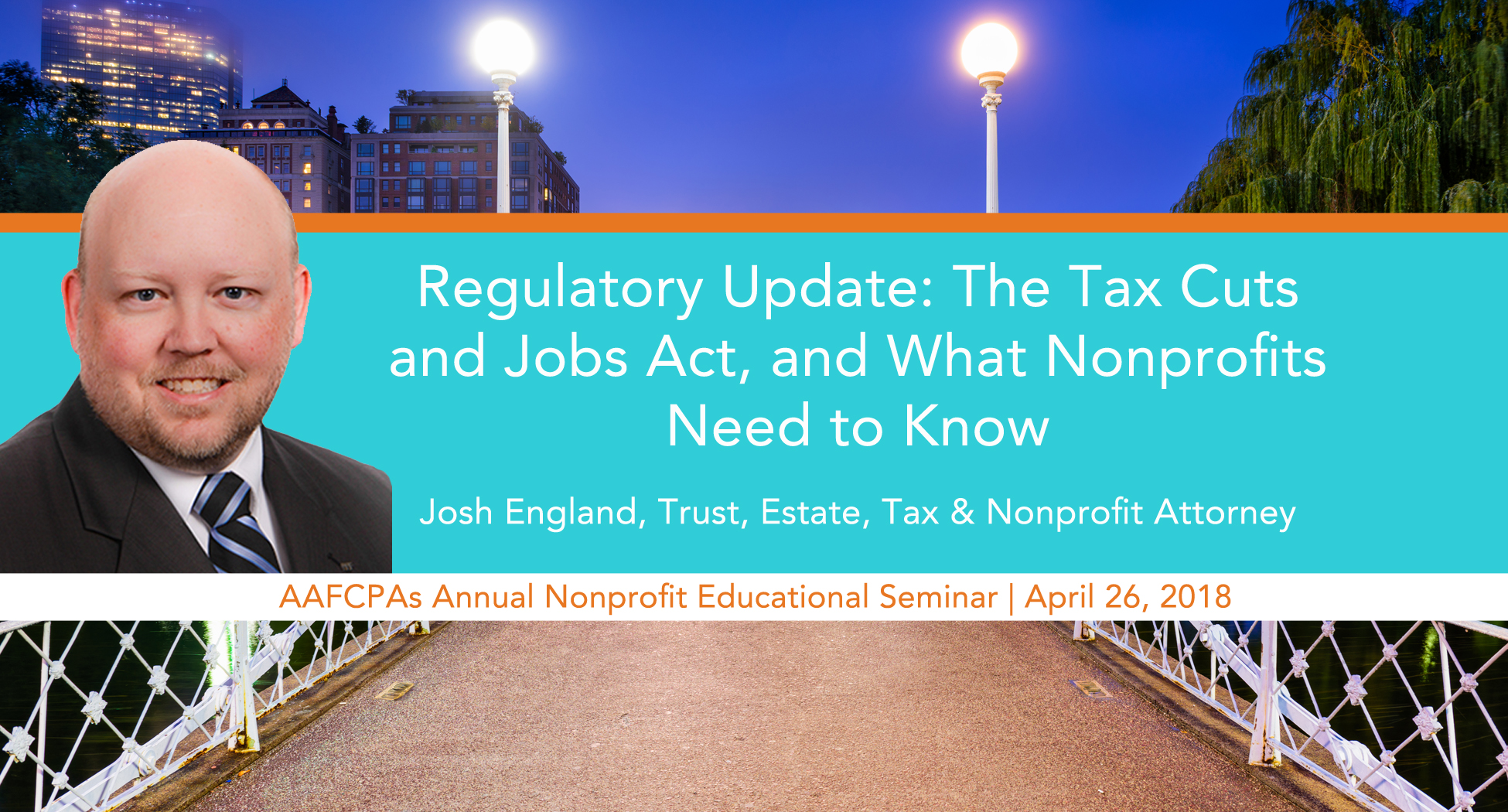Joshua England

AAFCPAs to Present Workshop on Right-Sizing Your Finance Function at Cannabis Convention, Boston
AAFCPAs has been selected to present an educational workshop: Right-Size Your Finance Function at the 5th Annual New England Cannabis Convention, March 22-24th, 2019, at the Hynes Convention Center, Boston MA. The New England Cannabis Convention in Boston is considered the can’t-miss event of the year by cannabis growers and business cultivators across the region. […]
Updates for Nonprofits under the New Tax Act
This blog was revised on 10/10/19. AAFCPAs would like to make Tax Exempt Organizations aware of recent legislative and regulatory updates related to the Tax Cuts and Jobs Act, (“TCJA”) and how these may affect charitable nonprofits. What is Considered a Nondeductible Parking Expense that will now Trigger Unrelated Business Income Tax (UBIT)? On December […]

What Nonprofits Need to Know about the TCJA: AAFCPAs to Present a Members-Only Webinar for the Providers’ Council
AAFCPAs Tax Consulting Strategists Joshua England, JD, LLM, and Chris Consoletti, JD will present a Tax Cuts and Jobs Act educational workshop on December 10th at 12pm, for the benefit of the Massachusetts Council of Human Service Providers, Inc. (The Providers’ Council). The Tax Cuts and Jobs Act (TCJA) represents a dramatic overhaul of the U.S. […]
AAFCPAs’ Tax Practice to Present TCJA “Issues Identification” Session at CMFEO Executive Breakfast
AAFCPAs Tax Practice Leaders Richard Weiner, CPA, MST, Julie Chevalier, CPA, and Joshua England, JD, LLM will present a Tax Cuts and Jobs Act educational workshop on October 16th, for the benefit of The Central Massachusetts Financial Executives Organization (CMFEO). For privately-held companies, the TCJA impacts your financial statements, operating model, liquidity, investments and capital, and people. In this […]
Webinar: 2018 Year-End Tax Planning for Individuals & Families
Information continues to emerge as a result of the monumental Tax Cuts & Jobs Act. For privately-held companies, the TCJA impacts your financial statements, operating model, liquidity, investments and capital, and people. For individuals, the TCJA impacts personal withholdings, charitable giving, family & education, retirement, and estate planning. AAFCPAs is pleased to offer a timely, […]

Educational Podcast: The Tax Cuts and Jobs Act, and What Nonprofits Need to Know
Listen to PodcastClick here to listen to podcast or use the above media player. The Tax Cuts and Jobs Act, known officially as H.R. 1, (The Act) represents a dramatic overhaul of the U.S. tax code, and includes widespread changes to the tax rules affecting charitable nonprofits. AFCPAs Joshua England, JD, LLP, Trust, Estate, Tax and […]
IRS’s Position on Taxability of Qualified Transportation Benefits is Broad Reaching, Adversely Affecting Many Nonprofits
As expected, the IRS has clarified the interpretation of its unrelated business income (UBI) regulations and confirmed the taxation of qualified transportation benefits, whether provided directly by you, through a bona fide reimbursement arrangement, or through a compensation reduction agreement. For-profit entities are no longer able to deduct these qualified fringe benefits programs for their […]
IRS Proposes Substantial Changes to the Use of Donor Advised Funds
On December 4, 2017 the IRS issued Notice 2017-73 providing proposed regulations under Internal Revenue Code § 4967 and requesting comments on issues involving sponsoring organizations’ Donor Advised Funds (“DAFs”). While these regulations are only being proposed at this time, Taxpayers may rely on the rules regarding fulfillment of donor pledges immediately. Public Support Test […]
Sweeping Changes Come to Tax Exempt Organizations Under the New Tax Bill
AAFCPAs would like to make Tax Exempt Organizations aware that the Tax Cuts and Jobs Act, known officially as H.R. 1, (the “Act”) has enacted widespread changes to the tax rules affecting charitable nonprofits. AAFCPAs has outlined four changes that are especially noteworthy: There is now a 21% excise tax on executive compensation exceeding $1 […]
